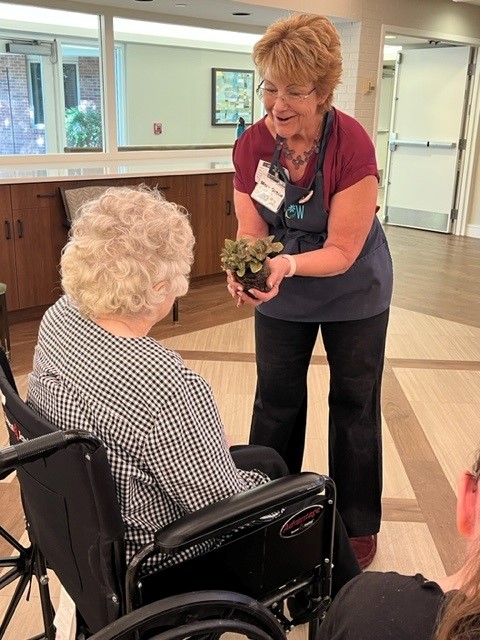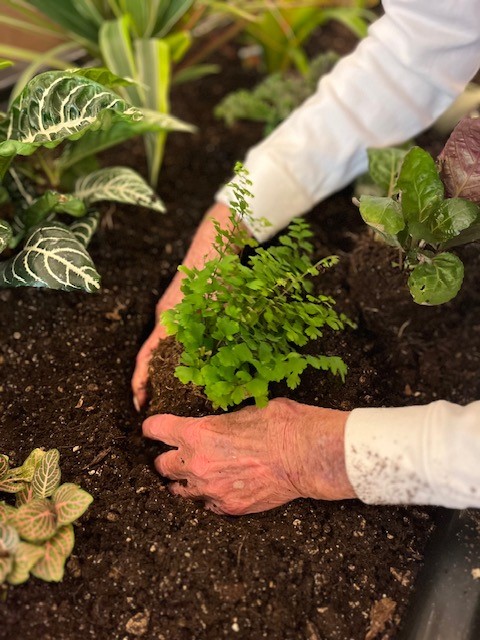Horticultural Therapy Garden Connects Someren Glen Residents with Nature Year-Round
Someren Glen - Christian Living Communities
For more information about the author, click to view their website: Someren Glen- Christian Living Communities
Jul 09, 2024
Colorado - Denver Metro
Email US
Click to Email UsThough the temperatures along the Colorado Front Range have dropped and the sun sets well before 5pm, the growing season has only just begun at The Suites at Someren Glen skilled nursing and memory support neighborhood. Our flourishing community was recently gifted a horticultural therapy garden from Eldergrow® through the legacy of former Christian Living Communities residents and supporters, Gil and Jeanette Deters.
Enriching Community Life through Horticultural Therapy

Our new garden from Eldergrow’s Therapeutic Horticulture Program brings nature indoors. It is thoughtfully designed for older adults living in skilled nursing and memory care communities like Someren Glen. The accessible, sustainable, and mobile garden includes a variety of eye-catching and beautifully fragrant plants, providing the kind of sensory experience that can only come from time spent among nature.
With the support and expertise of Eldergrow educators, Someren Glen residents planted their garden in September and have since enjoyed the connection, calm, and happiness that comes with nurturing a garden. “Teaming with Eldergrow increases residents’ ability to interact with nature throughout the year, providing a hands-on experience to care for and learn from the Eldergrow garden,” shares Steve DeBelle, Executive Director at Someren Glen.
Every two weeks, Eldergrow educators visit our community to teach classes and support residents as they connect with the plants’ multi-sensory characteristics, learn garden care, and maintain the health and growth of the garden. DeBelle is already seeing the impacts of the garden, sharing, “The residents love it. They are very engaged in caring for the garden. It was a wonderful addition to our community.”
For one of the garden’s caretakers, Someren Glen resident Shirl, the new garden brought back dear memories of her grandmother, who grew and tended roses. “The plants give back so much to us”, she expressed. “I feel so proud of this garden!”

The Benefits of Horticultural Therapy for Older Adults
In addition to the joy and delight already being felt from tending the Eldergrow garden, its potential long-term benefits for Someren Glen’s residents are significant. Studies indicate that therapeutic horticulture can reduce depression, improve balance, and lower risk factors for dementia. According to the Mather Institute, an organization focused on aging services research, a review of 20 years of research studying the impacts of indoor nature interventions in residential care environments showed that the positive outcomes of active interventions – such as those provided through Eldergrow’s Therapeutic Horticulture Program – “included improved psychological well-being, life satisfaction, social well-being, engagement, and quality of life.”
How CLC Supporters Make “The Fine Art of Living” Possible at Someren Glen
As a neighborhood of Christian Living Communities, a nonprofit organization with a mission of enriching the lives of older adults, Someren Glen is a creation and expression of the exceptional residents who call our community home – and those who have come before them, such as Gil and Jeanette Deters. The CLC community held a great significance to the Deters, who planned for their love and caring to extend to this community beyond their lifetimes.
This is the 16th year that the Deters’ gift has enriched the lives of residents at The Suites at Someren Glen. Their legacy lives on in the hearts of the many older adults and families who have been impacted by their generosity. Someren Glen can strive for and sustain our vision, mission, and values because of the investment of donor support. Learn more about supporting Someren Glen and other CLC communities at www.christianlivingcommunities.org/support-our-mission.
Contact us today to learn more about our long-term care services, purpose-filled life enrichment programming, and award-winning skilled nursing neighborhood at The Suites at Someren Glen.
- To view the original version of this article visit somerenglen.org/blog/horticultural-therapy-garden-connects-someren-glen-residents-with-nature-year-round/
- Seniors Blue Book was not involved in the creation of this content.
Other Articles You May Like
Alpine to start providing services to Children under Community First Choice!
We are excited to share with you that with the introduction of the Community First Choice (CFC) program, Alpine Homecare will begin providing services to children under CFC and CFC/IHSS starting July 1, 2025. Initially, our focus will be on children who have a parent, guardian, or close relative who can be hired as their caregiver. Given our very competitive wages and unmatched benefits program (for a non-medical agency), we believe Alpine is well-positioned to become the employer of choice for parent (and non-parent) caregivers. Alpines benefits package includes a 401 (k) with employer match, Paid Time Off, Health Insurance (min 50% paid by us), supplemental insurance (including dental vision, as well as zero cost virtual primary/urgent care, virtual behavioral care, select RX coverage), employee of the month/year ($50/$500 bonus) and more.Please do not hesitate to contact Alpine at 303-309-6202 - hello@alpinehomecare.com for more information.
Alpine Homecare is celebrating 25 Years with a BIG Thank You to Caregivers! Over $100,000 in caregiver bonuses announced!
Hey fabulous Alpine caregivers, get ready to cheer!Thanks to Alpine Homecares upcoming 25-year anniversary and a one-time ARPA direct provider payment, we are showering our amazing caregivers with over $100,000 in special bonuses. This is our thank you to the wonderful women and men who make Alpine special! Here is the Scoop:Join Alpine by July 1, 2025 (if you are not already part of our team) and stay with us at least through December 12, 2025 (the bonus payment date) and you will receive a special $300 Anniversary Bonus! It is our way of saying "thank you" for being part of our caring community.Whether you are already part of our family or just thinking about jumping in, there has never been a better time to join Alpine. So, spread the word to your friends, family, and neighborsAlpine is always hiring!Why Alpine is the best home care agency to work for in metro Denver:- Competitive pay rates, including overtime (1.5x)- 401(k) with employer match (because retirement planning matters!)- Paid time off (for those well-deserved breaks)- Health insurance (min. 50% paid by us)- Various supplemental insurance (including dental, vision, as well as zero co- pay virtual primary / urgent care, virtual behavioral care, RX coverage, etc.)- Employee of the Month/Year recognition- That exciting $300 bonus (who couldn't use extra holiday shopping money?)- The satisfaction of making a difference every dayFor all the details, call us at 303-309-6202 Monday through Friday, 8am-6pm, or check us out at www.alpinehomecare.com.Share with your friends because good news (and great job opportunities) are meant to be shared!
Community First Choice (CFC) is coming on 07/01/25
Get ready for Community First Choice (CFC), a new State Medicaid program that expands access to HCBS services! Starting 07/01/25 your favorite home care services, i.e. Personal care (PC), Homemaker (HMK) and Health Maintenance Activities (HMA), will start to be transferred to CFC:While the main home care services (PC, HMK, HMA) are moving over to CFC, other services, such as adult day, respite and mentorship, etc. remain under their respective waivers. Clients will be able to access services under waivers and CFC at the same time. In addition, certain limitations, such as for relative personal care (up 8.5h per week or 40h per week under IHSS) are being replaced with new limitations for legally responsible individuals (520h per year for homemaker). There is also some broadening of existing service options through the introduction of acquisition, maintenance & enhancement of skills. As mentioned above, CFC is being introduced starting 07/01/2025 with clients moving over to CFC on their Continued Stay Review date (CSR). The process is expected to be completed by 06/30/2026. Alpine can help you navigate these upcoming changes. Just give us a call at 303-309-6202
Local Services By This Author
Someren Glen - Christian Living Communities
Memory Care 5000 East Arapahoe Road, Centennial, Colorado, 80122Residents at Someren Glen, a Continuing Care Community, have been treated like family in a gentle, kind and dignified environment that fosters friendship and personal and spiritual growth. Our safe, comfortable skilled-nursing memory care neighborhood integrates support for both physical and cognitive needs, encouraging each resident to find ways to experience purpose and enrichment. Our caring, trained staff assists with activities of daily living as well as medical care. At Someren Glen, everyone is empowered to discover the Fine Art of Living. Call for a personal visit today!
Christian Living Communities - Someren Glen
Rehabilitation Facilities 5000 East Arapahoe Road, Centennial, Colorado, 80122Delivering quality services since 1990, staff strives to provide first-rate care as well as programs designed to help residents maintain physical, mental and social skills. Private accommodations are available. Skilled nursing accepts private pay and is licensed for Medicare and Medicaid. Call for a personal tour!
Someren Glen - Christian Living Communities
Skilled Nursing 5000 East Arapahoe Road, Centennial, Colorado, 80122Residents in the Suites at Someren Glen, a Continuing Care Community, have been treated like family in an empowering, kind and caring environment that encourages friendship and personal and spiritual growth. Our care team strives to provide first-rate care as well as programs designed to help residents maintain spiritual, physical, intellectual and social skills. Private and semi-private accommodations are available. Additionally, we have one of the only skilled-memory care neighborhoods in the metro area. Skilled nursing accepts private pay and is licensed for Medicare and Medicaid. Call for a personal visit today!



